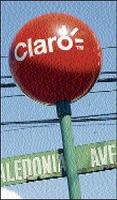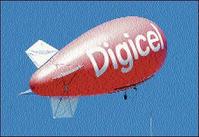
The Claro bubble.- Norman Grindley/Chief Photographer
Retailers say the high shopping season was one of the most disappointing in recent memory, but it did not stop the mobile phone companies from, in some cases, literally painting the capital red - with banners, blimps, bubbles, balls and branded bus stops.
And then there were the cars, and the advertisements, and the giveaways, and the Digicel walls.
None of the rivals - we'll call them 'The Mobile Three' - LIME Jamaica, Claro Jamaica and Digicel Jamaica - were prepared to say how much they shelled out for their promotional blitz, but we can guess at the value of some of the gifts and advertising spend.
A Mini Cooper is valued at about $4.2 million - Digicel gave away 14 of them, plus $1 million each week over the month of December.
A C-class Mercedes Benz runs for about $6.5 million - Claro handed out nine of those.
more cash
LIME thought it took much more cash to care, and that its customers would care a lot for hard currency - its gift was US$1 million (J$80 million). That, however, was on offer across its 13 Caribbean markets, and no Jamaican won it.
The companies also gave away phones, including high-end BlackBerrys that go for J$35,000 to $45,000 a pop, and higher; and offered specials on handsets and phone plans.
As for the advertisements and promotions, Digicel took top prize for creativity and sheer presence.
The city was festooned with Digicel branded bus stops, a blimp that floated above its headquarters, over the holidays and into the new year (we could not get them to say how much that cost, and we had no basis for comparison), a cultural wall in New Kingston and a sports wall in Barbican.
The national advertising companies quote prices in the thousands of dollars. A JUTC bus full wrap is around $960,000; the wall is 48,000 per each 14x5 foot display - productions costs could add more; bus shelters are about $130,000 per annum; a tri-media board ranges between $400,000 and $500,000; a super billboard is upwards of $250,000, plus production costs, and a standard billboard is about $200,000.
Claro gets the prize for being 'ballsy' with their street sign displays, which outdoor advertising agencies say are now in high demand by other companies.
psychedelic colours
LIME, too, took on a new image with its psychedelic colours, which appeal to teens. They get the Sunday Business prize for 'not giving up and rolling over to the competition'.
So with all the giveaways and multimillion-dollar mobile blitz, what was their reward? Claro and Digicel both say they gained business, and each claimed they lost no ground in relation to market share.
"Our objective with our outdoor advertising was to create maximum awareness of our new brand," said Yanique Forbes, advertising and promotions manager at LIME.
"Our corporate building, which is our local headquarters, has what we call a 'building drop', which is a huge advertising banner that you can see from a distance."
The rebranded LIME, Forbes said, looked beyond the traditional advertising vehicles to offer free bus fares, lunch-hour treats and happy hours.
"We literally took LIME to the public with what we called 'Random Acts of Kindness'," she said.
Claro says its advertising was pitched at young people because they influence purchase decisions, but that its marketing programme targeted a wide base.
"We have got a very warm reception from the Jamaican public," said Noel Esty, Claro's commercial director.
"The initial stock of iPhones are sold out and we are seeing the effect of our work on the ground; and there is more is to come."
Claro Jamaica has exclusive rights from Apple Inc to sell the iPhone plan in Jamaica.
The mobile telecommunications company was rebranded from MiPhone after the parent company, Oceanic Digital Jamaica limited, was sold to América Móvil (AMX) in 2007.
making headway
AMX chose to rebrand the operation as Claro to create the perception that the company, through association with an operation that has 153 million customers throughout Latin America, was more formidable than its 220,000 customers suggest; and a match for Digicel, whose Jamaican customer base is nine times as large.
Claro Jamaica has six customer-care centres, and more than 180 sales points throughout Jamaica, and is now trying to make headway with the erection of its cell sites, about 500 to 600, as it builds out its 3G network.
Digicel has 180 stores - several of which were upgraded for US$10 million ahead of the holidays - and about 1,000 cell sites.
The Irish company is seeking to go 'beyond 3G', with a licence application to Spectrum Management Authority pending.

Lime 'building drop' banner.
"We have applied for a WiMAX licence. WiMAX, which essentially means 4G, will allow us to deliver affordable broadband to the population of Jamaica. We're excited about it," said the Irish company's Chief Executive Officer Mark Linehan.
Through the fourth-generation technology, Digicel plans to package a comprehensive IP solution where voice, data and streamed multimedia will be available to subscribers on an anytime, anywhere basis, and at higher data rates than 3G.
great Christmas period
"We're just coming out of a great Christmas period where we have seen our subscriber numbers increase. we're really pleased with the way things are going and will continue to focus on delivering best value, best coverage and best service to our customers in Jamaica," Lineham tells Sunday Business.
"As you'd expect, we have plenty of exciting new products, services and promotions up our sleeves."

The digicel ballon that floated above New Kingston over the holidays.
Digicel has surpassed the two million subscribers mark, the CEO said, to further cement itself as the number one telecoms provider. LIME is second with about 660,000 subscribers.
mark.titus@gleanerjm.com